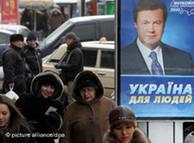New electoral legislation: scope for election fraud

On Thursday President Yanukovych signed the new law on the parliamentary elections. Specialists warn that under the law the elections will be unfair and unconstitutional.
As reported, the Law has the 50-50 mixed system favoured by the Party of the Regions: This is described in the Venice Commission Opinion as a mixed proportional-plurality (majoritarian) electoral system, where 50 percent of the MPs (National Deputies) are elected through political party lists in a single nationwide constituency and the other half are elected in single mandate constituencies (first past the post, one round).
Only political parties may take part in the elections, not blocs
A party must now receive 5% of the votes to get into parliament, this having been raised from 3 percent.
The option on the ballot paper “against all (candidates)” has been removed.
A person can be put forward both according to a political party’s candidate list, and once in a single mandate constituency.
Analysts are critical of the law and point out that the last of the new features has already been found unconstitutional by the Constitutional Court. “There is no logic in holding elections according to a law with an unconstitutional norm. There won’t be honest elections with such a norm”, the Head of the Committee of Voters of Ukraine, Oleksandr Chernenko says.
Members of the opposition could once again make a submission to the Constitutional Court, but Yaryna Zhurba, electoral law specialist for the Centre for Legal and Political Reform says that it is not clear now what the Court’s reaction would be. It’s possible that now the Court will decide that a person can stand for office both on a party list and in a single mandate constituency.
On the other hand, Volodymyr Fesenko from the Lenta Applied Political Research Centre is convinced that none of the members of the opposition will approach the Constitutional Court since that electoral mechanism is convenient first and foremost for the opposition. He says it’s a chance for opposition parties and small parties to get as many people into parliament as possible.
Analysts are agreed that the new electoral legislation has not heeded recommendations from the Council of Europe’s Venice Commission. Yaryna Zhurba points out that the Venice Commission insisted that all changes needed to be made through consensus. Yet the law, submitted by the parliamentary majority had controversial norms from the outset, as well as loopholes for abuse, for example, the provision allowed ballot papers to not be numbered.
She says that after the opposition insisted on removing such items from the law, the pro-government ruling majority announced that consensus had been reached and formally implemented one of the key recommendations of the Venice Commission. However she is convinced that this is political manipulation and that no consensus was in fact reached. Anatoly Hryshchenko, MP from Our Ukraine – People’s Self-Defence agrees. He did not vote for the new law and is outraged that some of his colleagues did.
The analysts agree that the draft law gives considerable scope for election fraud. These include fiddles with the ballot papers and voting at home. Oleksandr Chernenko points out that the new law allows for amendments to be made to the voter lists by court order. He explains that a person can that way before the elections say that they are not going to be at the place they’re registered at, can vote somewhere else and then, through a court order, vote again at the place they’re registered.
The Deputy Head of the Central Election Commission, Andriy Mahera does however believe the law is better than those under which parliamentary elections according to a mixed system were held in 1998 and 2002.
From the report by Lilia Hryshko at http://dw-world.de/dw/article/0, , 15590991, 00.html





